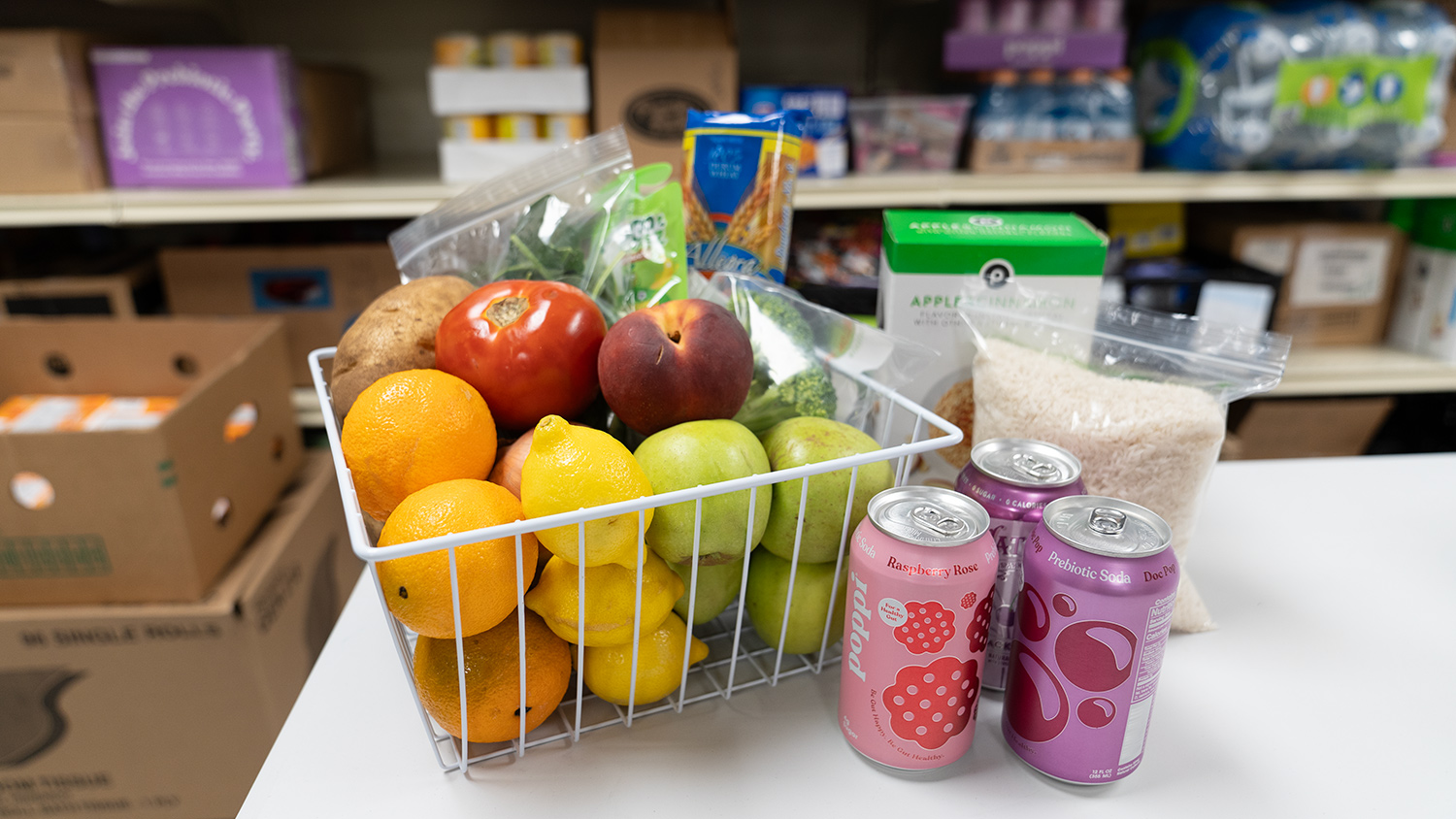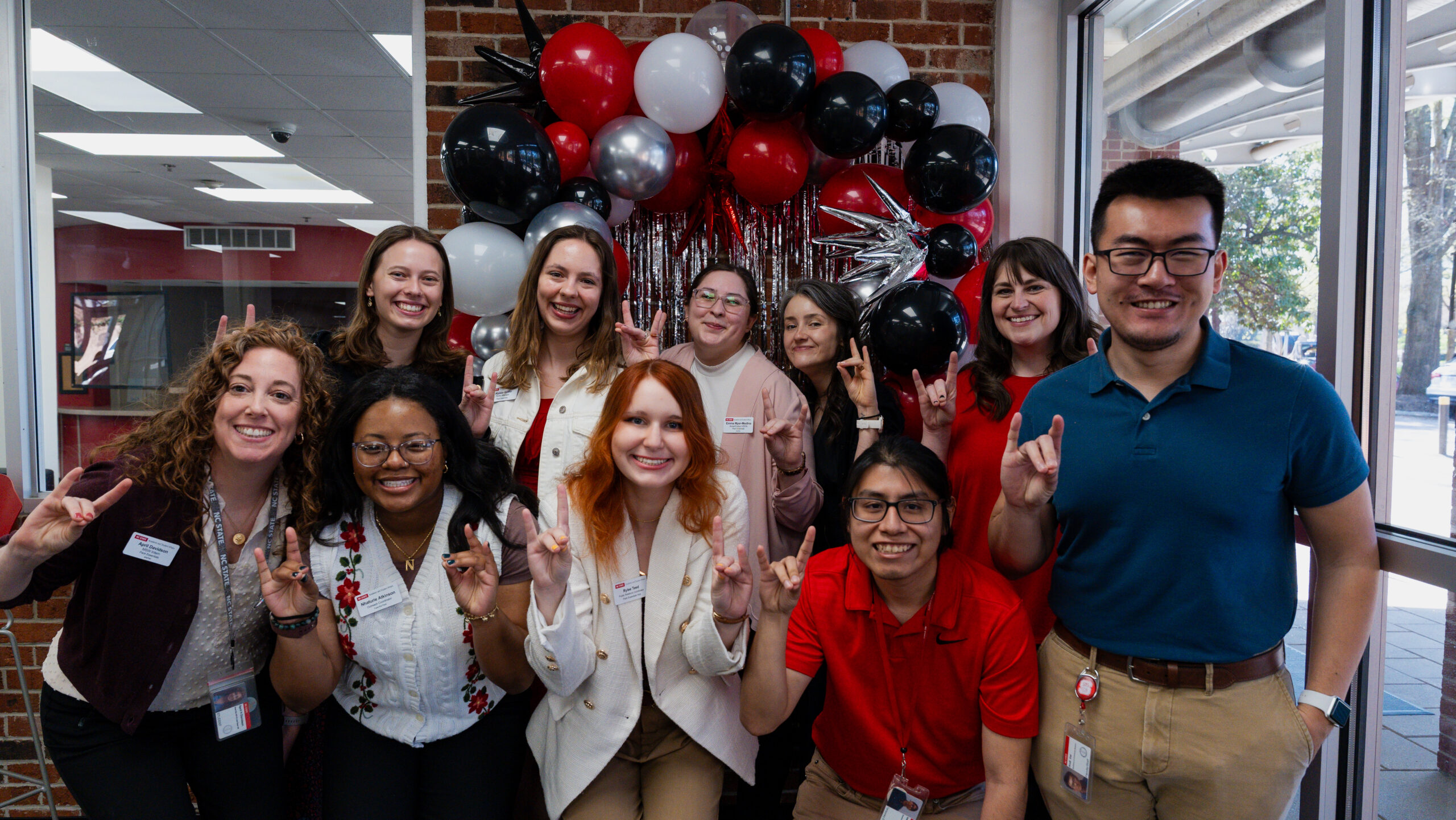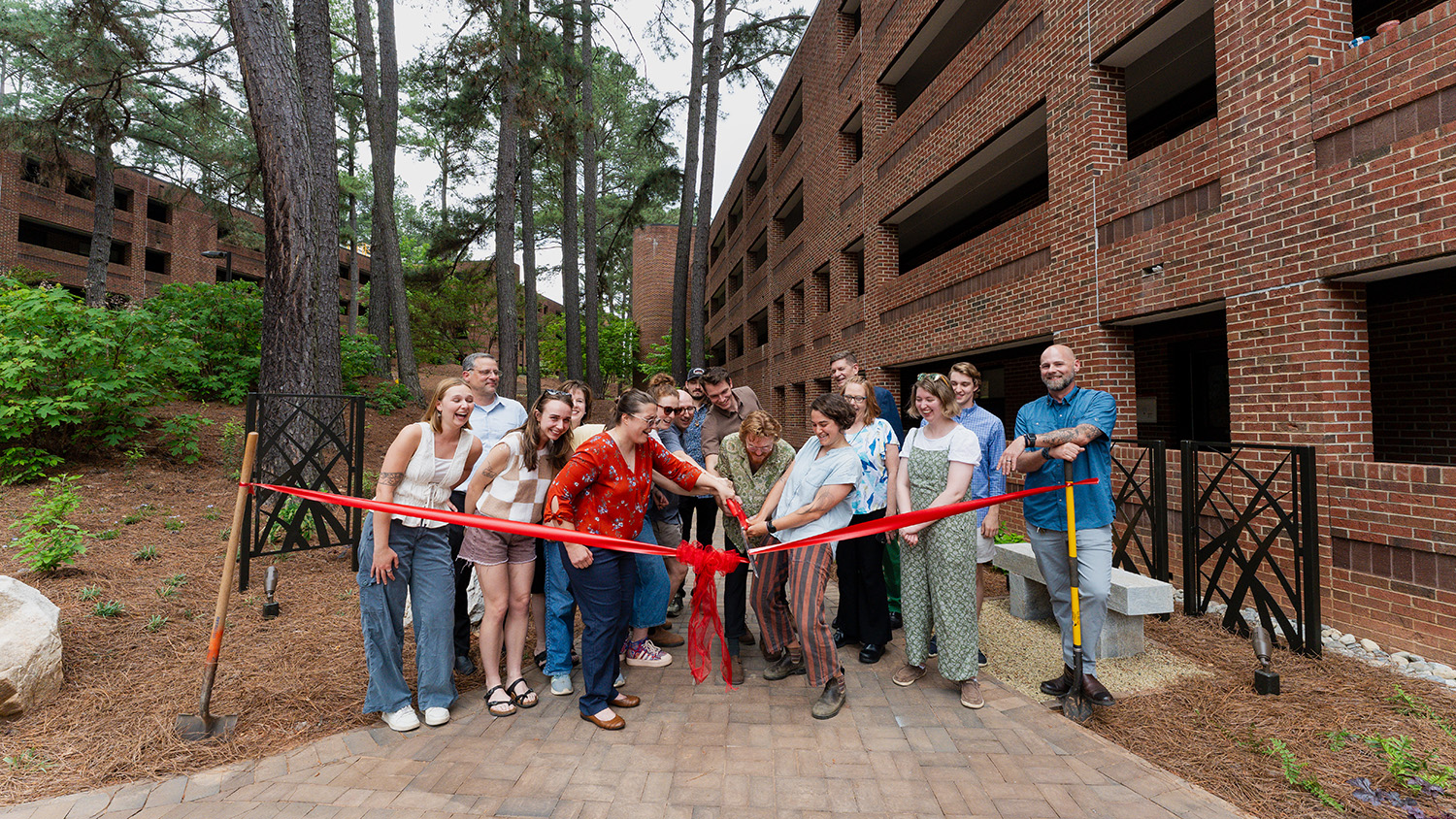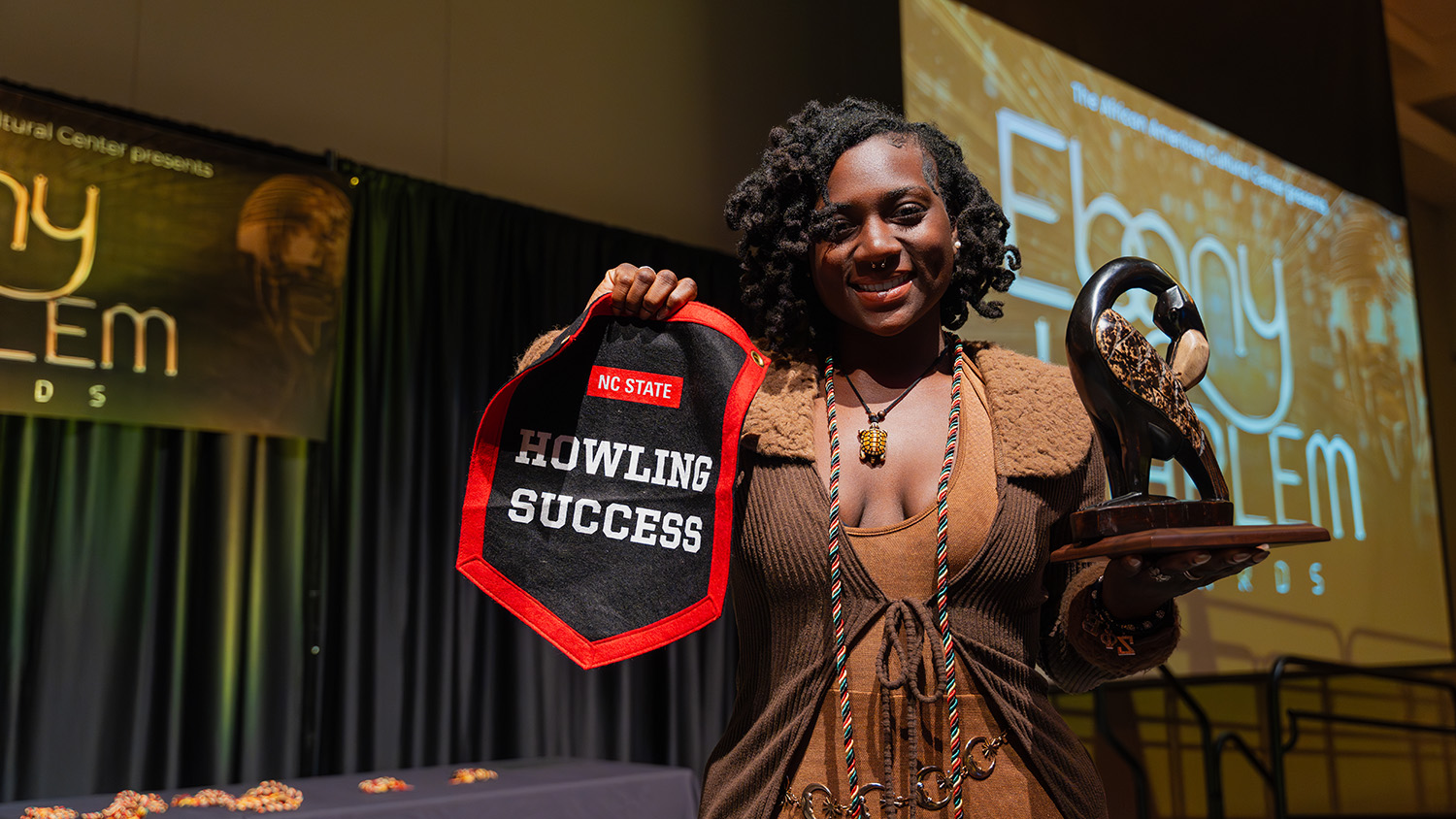New Pack Essentials Hub Ready to Serve Students, Build Community
The Pack Essentials program now has a permanent physical home in North Hall.

NC State’s Pack Essentials program has been setting students up for success since 2017 by helping them meet their basic needs such as food, housing and more.
For the first time since its inception, the program has a physical home. The new Pack Essentials Hub, located on the first floor of North Residence Hall on Hillsborough Street, opened in April and will be celebrated in a ribbon-cutting ceremony on Sept. 11, which will include Chancellor Randy Woodson and other leaders from campus and the greater Raleigh community.
A New Home
The new hub is the permanent location for the Feed the Pack Food Pantry, which has now had five different locations since its inception in 2012, and will also soon include drop-in hours from the NC State counseling center and career center, among other support services.
NC State Assistant Vice Chancellor and Student Ombuds Mike Giancola said that he, Associate Director of Student Leadership and Engagement, Brian Mathis and others have been working on the space for about a year, but the vision for a centralized location for basic needs was part of the Pack Essentials Steering Team’s call to action in 2019.
The Feed The Pack pantry was last located in the Quad Commons, but University Housing agreed to what was essentially a land swap with Pack Essentials, with a regional package hub going to the Quad Commons, and Pack Essentials taking over the space in North Hall. The new location is the first time the pantry has had a location specifically designed and renovated for its use.
Raleigh’s Interior Architects designed the new space, but University Housing’s facilities division was responsible for its renovation, which included work from plumbers, painters, HVAC technicians and electricians.
“Our team really likes that type of stuff,” said Pete Fraccaroli, University Housing’s director of facilities and business operations. “It goes back and reminds us that we’re part of something bigger than just our small group. For us to be able to be a part of that and give back to our students in such an important way, food insecurity is a huge issue for our students. It’s nice as a facilities team to have those projects that really reinforce our connection to student success.”
It goes back and reminds us that we’re part of something bigger than just our small group.
What was once a little-used computer lab in North Hall has now become a perfect spot for the Food Pantry, with plans for many additional services to come.
“I like that tangible aspect of the work that we do,” Fraccaroli said. “To be able to watch an underutilized space be converted into something that’s so impactful to our students is very rewarding.”
Meeting Basic Needs
Giancola described the Pack Essentials Hub as “a place where students can access resources to meet their basic needs.”
“We are talking about any basic need that is going to keep students from being able to be focused on their academics,” Giancola said. “When a student comes to NC State, we want them to be studying engineering, studying psychology, studying abroad, doing undergraduate research and making new friends. For a significant portion of our student body, one of their major concerns is food and housing security. We want this to be a place where they can meet multiple of their basic needs at one time, so they can spend their time doing classwork and other fun activities with their friends.”
We are talking about any basic need that is going to keep students from being able to be focused on their academics.
A common misconception about food pantries is that they’re simply for “canned goods” or a place for people to pick up canned/nonperishable foods.
That couldn’t be further from the truth with Feed the Pack, with canned goods making up the smallest section. The spacious pantry includes large refrigerators stocked with fresh produce, dairy products and even desserts/treats such as cookies, pies, cakes, muffins and donuts. Giancola explained that the pantry’s priority is providing fresh, healthy, culturally appropriate foods.
The pantry will be open from 12-6 p.m. on Tuesdays and Wednesdays, 3-9 p.m. on Thursdays and 12-4 p.m. on Fridays. There are two parking spots on the west side of North Hall designated for the pantry, and students can also access North Hall via the Wolf Line bus routes 52 and 41, both of which stop at the Belltower, the closest stop to North.
As the hub continues to expand, Giancola said the Pack Essentials program has a vision of adding permanent staff whose “day jobs” are to work in the hub and help students. The hub will also feature cookware kits that students can check out.
The pantry will also always have menstrual products available, and Giancola said one of the big goals for the 2023-24 school year is to keep the pantry readily stocked with personal health and hygiene products such as dental hygiene, soap, deodorant, shampoo, vitamins and over-the-counter medicines as well as toilet paper and clearing products.
The Division of Academic and Student Affairs created the Pack Essentials program in 2017 after a survey found that 14.5% of NC State students experienced food insecurity within the previous 30 days, and 10% experienced housing insecurity within the previous 12 months.
Those numbers ballooned to 23 and 15 when the survey was replicated in November 2020, at the height of the COVID-19 pandemic when many students faced unemployment. While NC State is one of the leading schools in the nation in terms of addressing food and housing insecurity, Giancola said there’s still work to do, and a gap between the number of students that use the program and those who need it.
“The only statistic that really matters to me is one,” Giancola said. “If one student on this campus is struggling with their food and housing on a campus that has so many resources and so much opportunity for students to reach their potential, we need to address that issue.”
If one student on this campus is struggling with their food and housing on a campus that has so many resources and so much opportunity for students to reach their potential, we need to address that issue.”
Students can still access a list of resources on the Pack Essentials website, and submitting a Pack Essentials application is the quickest way for students in need to receive aid. Since March 2020, the Pack Essentials program has received over 7,000 applications and provided over $2 million to students through the Student Emergency Fund, meal share program and Feed the Pack.
Community and Convenience
Giancola said the two biggest factors the Pack Essentials program hopes to provide for students with the new hub are convenience and community.
It’s a place students can go to get multiple needs met simultaneously, including picking up food from the pantry, checking out cookware kits, and, soon to come, drop-in visits from the counseling and career centers.
It also provides students experiencing food and housing insecurity with a sense of community, belonging and solidarity.
A student who only spends a few dollars a day on food might see another student with a $6 coffee and wonder if they belong or “fit in” at NC State.
“This hub is a place where we make sure students know they fit, that they belong, that they can access the resources and we can have a sense of community,” Giancola said.
When the pantry opened on Tuesday, Aug. 29, about 60-70 students were waiting in the North Hall lobby to access it when someone brought a bike and asked if they could donate it. Before opening the pantry, Giancola asked if any of the waiting students needed a bike, and about 15-20 students raised their hands.
The Pack Essentials staff asked if anyone had an upcoming or recent birthday, and a student who celebrated theirs the previous day was the lucky winner of the bike. Giancola then asked the waiting crowd to sing “Happy Birthday” to the student.
“That is community,” Giancola said. “We are part of the Wolfpack community. That is what we envision will happen here. Those students left feeling like they are a part of something bigger. If they are feeling isolated because of their experiences with food, housing or financial insecurity, they know they are not alone, there are people at the university that care about them, and there are resources to help. At the end of the day, what are we about besides helping students earn degrees and preparing them for their futures.”
- Categories:


